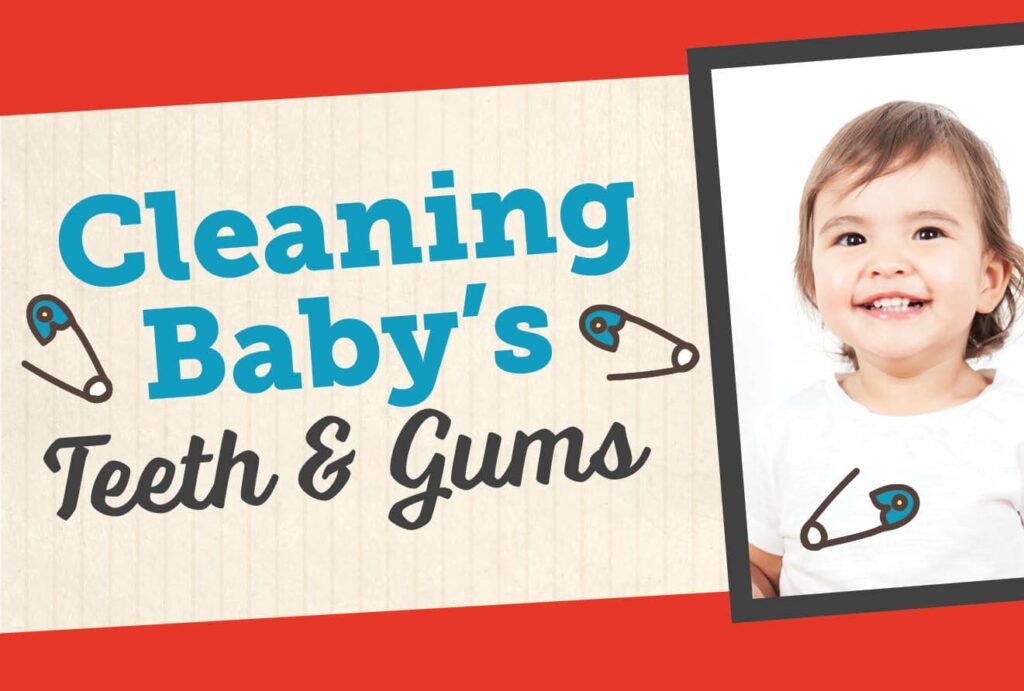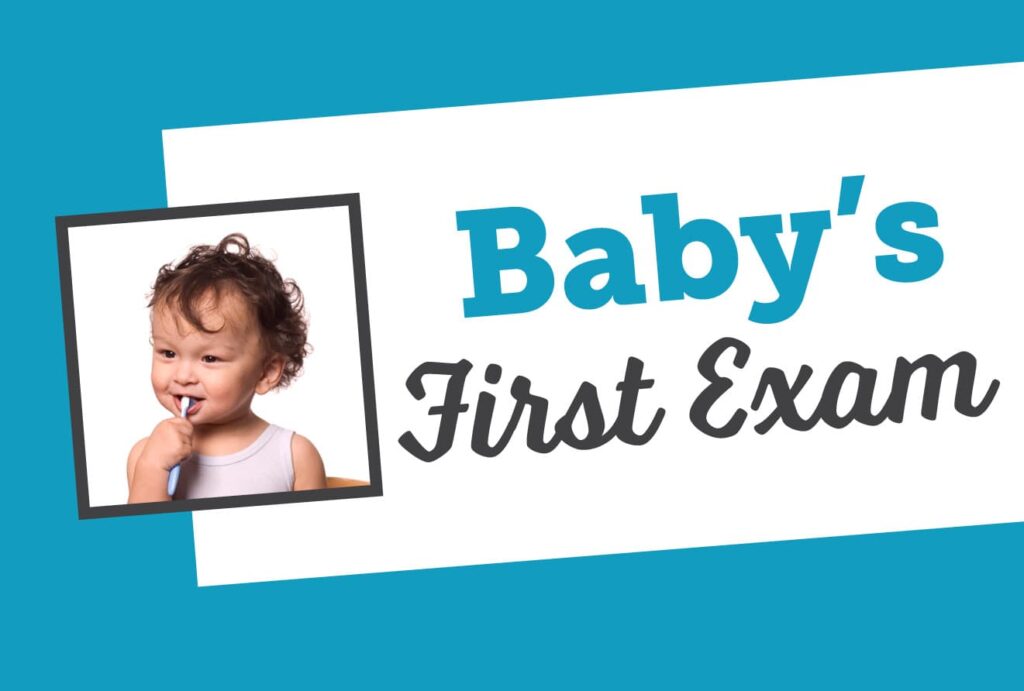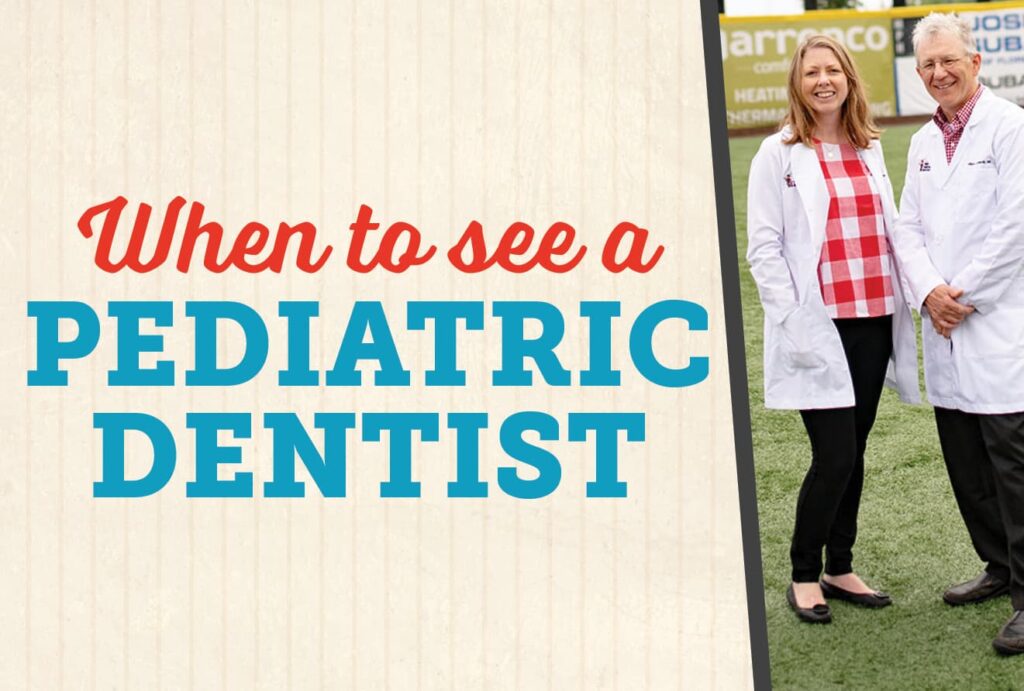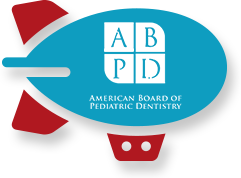August 23rd, 2021

Did you know that good oral hygiene begins early? Even before your baby’s first tooth appears, the gums can benefit from your careful attention.
Caring for Gums
After breast- or bottle-feeding, wrap one finger with a clean, damp washcloth or piece of gauze and gently rub it across your baby’s gum tissue. This practice both clears your little one’s mouth of any fragments of food and begins the process for building good daily oral care habits. As your baby continues to grow, consider carefully what you put in your child's bottle or sippy cup especially at bed time.
Baby’s First Tooth
When that first tooth makes an entrance, it’s time to upgrade to a baby toothbrush. There are usually two options: a long-handled toothbrush that you and your baby can hold at the same time, and a finger-puppet-like brush that fits over the tip of your pointer finger. In each case, the bristles are soft and few. Regularly cleaning baby's teeth helps establish this habit from an early age.
Under age three, we recommend using a grain of rice sized amount of fluoride toothpaste. During the teething process, your child will want to chew on just about anything, and a baby toothbrush with a teether can become a favorite toy during this period.
Proper oral hygiene begins early and works great when parents make cleaning baby’s teeth a daily part of their routine from early on. These tips should help your child should build the habits that make a grand slam smile!
Tags: Dental Care, Preventing Cavities, Baby Teeth, Oral Care, Cavities, Cavity Prevention, Oral Health, Infant Oral Care, Pediatric Dentistry, Pediatric Dentist
Posted in Oral Care, Dental Care, Oral Health, Preventing Cavities, Baby Teeth, Preventative Care, Dental Hygiene, Teething, Dental Health, Gum Health, Oral Health Care, Healthy Mouths, Baby Care | No Comments
October 21st, 2019

Trips to the dentist are an essential part of oral care, but for a child, the first time can be scary. Sitting in a chair, under a light, while a stranger pokes inside their mouth is understandably daunting.
We are often afraid of things we don’t understand, so the best way to make your child’s first trip to the dentist smooth sailing is to help them understand what to expect before they get to the office. Knowledge will make the visit more comfortable and relaxing.
Normalize visits to the dentist with books, or simply talking about it! There are many children’s books out there that help make a visit to the dentist easier! A list of books can be found here. Dr. Jennison even wrote a children's book, A Sugarbug's Delight.
We also recommend roleplaying with a pretend visit! Making the dentist fun at home will make the outing more fun when the time comes. Be sure to use positive vocabulary, avoiding words like shot and hurt. Instead, talk about a clean, strong smile. In keeping with the positive theme, be sure not to bribe your kids with a post-appointment treat. Bribery gives the idea that there is something to be nervous about. Instead, opt for surprising them with some sort of reward after the fact.
Here at our practice, because we specialize in pediatric dentistry, we too have tactics to make the appointment go easy and smooth for both you and your child! Some children are ready to sit in the dental chair at their first appointment. Others do better in a knee to knee position, where they lay on a board between a parent and the doctor. Tell your child that the team will count and shine their teeth. Thank you for trusting us to take care of your child in a specialized way.
So when should you schedule this trip? As a rule of thumb, kids should start going to the dentist by age 1 or within six months after their first tooth erupts. We’ll see you then!
Tags: Dental Care, Baby Teeth, Oral Care, Cavity Prevention, Oral Health, Early Infant Oral Care, Infant Oral Care, Pediatric Dentist, Healthy Teeth, Childrens Teeth, Kids Teeth
Posted in Uncategorized, Cavity Prevention, Oral Care, Infant Oral Care, Dental Care, Oral Health, Preventing Cavities, Baby Teeth, Preventative Care, Good Dental Habits, Dental Health, Pediatric Dentist, Oral Care for Kids, Oral Health Care, Healthy Mouths, Healthy Kids, Childrens Teeth | No Comments
January 21st, 2016
Most parents understand the benefits of their child seeing a pediatrician instead of simply a general practice doctor. However, it’s often not clear why a pediatric dentist is just as important and preferable over a general family dentist. Choosing a pediatric dentist will make sure that oral development is going as it should. Additionally, your pediatric dentist will help your, and your child, establish dental habits that will lead to a lifetime of good oral health.
Why Union Pediatric Dentistry?
Because pediatric dentists specialize in treating the dental needs of children, we have to complete an additional two years of specialized education to earn our designation. Beyond additional schooling, our pediatric dentists are board certified by the APBD. This certification shows our commitment to the highest level of care for our patients.
Everything from our baseball-inspired, kid-friendly office to our communication style, are designed to provide the best care for your child.
Our goal is to help every child feel comfortable and excited about visiting our office and to teach them how to care for their teeth. If needed, we would be happy to set up a “friendly visit” to let your child get familiar with our office and relieve any fears they may have. Pleasant visits to our dental office help to establish trust and build confidence for future appointments.
Our pediatric dentists also have special training in helping children with special needs. We encourage you to reach out to us about your child's unique situation. Besides a designated sensory room, we want to partner with you to accommodate your child's special needs.

At what age should my child see a pediatric dentist?
The American Academy of Pediatric Dentists, along with Dr. Greenhill, Dr. Jennison, and Dr. Britt, recommend taking your child to a pediatric dentist about six months after the first tooth comes in. For most children, this is around their first birthday.
What about teens?
Just because your child is a teenager, doesn't mean your child's teeth don't require special attention too. Some orthodontic needs are best addressed in adolescence. Additionally, decaying or poorly situated teeth can make teens self-conscious. Teens have more control over their own diet. Couple that with busy schedules and we often see a tendency to eat more unhealthy snack foods. This often becomes a significant part of their diet, resulting in poor oral health. Through a positive approach we teach preventive dental health care throughout the teenage years.
We want our dental practice to be a comfortable and inviting place.
Call our office today and let us show you how we accomplish this goal!
October 23rd, 2014

Occasionally parents will reach out to us because they’ve been alarmed by the sounds their children make while sleeping. It’s not uncommon for children to grind their teeth, especially during sleep. In fact, some estimates put that number close to 33%. Tooth grinding, or bruxism, is most common when baby teeth begin to emerge and permanent teeth come in. And while it generally goes away, there are a few considerations you should be aware of.
What causes bruxism?
We aren’t always 100% sure why children grind their teeth. Oral discomfort as teeth shift and realign may cause much of the temporary bruxism, as well as allergies and other minor illnesses. Bruxism may also be caused by minor changes in inner ear pressure, similar to what’s experienced on an airplane. Ongoing teeth grinding may be more serious and can sometimes be the results of anxiety, stress or fear. While most children stop grinding their teeth over time, it’s often important to look at your child’s overall health as well as the frequency and severity of tooth grinding to determine if intervention is necessary.
When should parents worry about bruxism?
Again, bruxism is extremely common, and most children grow out of the habit. But as with any issue you are concerned with, please always feel free to reach out to us with your questions. The following list of symptoms are signs that your child’s teeth grinding may require additional investigation:
- If your child is having trouble sleeping or is waking frequently throughout the night
- Jaw pain or soreness
- Headaches
- Tooth sensitivity or pain not associated with other dental issues
- Teeth begin showing signs of wear
- Damage to the soft tissues of the mouth
- Loud, persistent grinding that doesn’t seem to subside over time
What can parents do to help alleviate minor bruxism?
If your child occasionally grinds his or her teeth at night, and isn’t showing any serious side effects like those mentioned above, you may try the following tips to reduce or eliminate bruxism without the intervention of a dentist:
- Work to identify and decrease your child’s stress. Allow your child to talk openly about his or her feelings.
- Be sure your child is getting a proper diet
- Since dehydration may be linked to bruxism, be sure your child is drinking enough water
Of course, you should always make us aware of any issue involving your child’s teeth. We can help you monitor them for any potential issues. Never hesitate to reach out to us with any questions or concerns you might have.
September 11th, 2014

When a dental emergency occurs, it’s essential to get prompt treatment. Of course, the first (and best) step is to have an established dental home. Whether an injury happens on the playground, in school or at home, having a dental home and maintaining regular dental check-ups and cleanings is the first and best way to be prepared. Not only will you have an existing relationship already established, but you will also have someone to call who can provide guidance, care and support.
Like all emergencies, dental emergencies appear out of nowhere and demand immediate attention. Knowing what to do when an emergency arises is key to having a positive outcome and preventing a bad situation from getting worse. Taking the right action, can mean the difference between saving or losing a tooth. Just as we spend time learning first aid procedures for bodily emergencies, making a special effort to focus on handling dental emergencies means that you are prepared to take care of any situation, no matter what.
According to the American Academy of Pediatric Dentistry (AAPD), here are a few best practices for the following scenarios:
- If a baby tooth is knocked out - Contact the dentist ASAP.
- If a permanent tooth is knocked out - Find and carefully rinse the tooth in cool water. Do not use soap or scrub the tooth. Simply rinse it in cool water. Replace the tooth in the socket, if possible, and hold it in place with a clean piece of gauze or a washcloth. If putting the tooth back in the socket isn't an option, place the tooth in a clean cup with milk, saliva, or water. Contact the dentist immediately. Prompt treatment is required to potentially save the tooth.
- If a tooth is chipped or damaged - Contact the dentist immediately. Find any tooth fragments. Rinse in cool water and place in a clean cup with milk, saliva, or water and take them with you to the dentist. Prompt treatment is critical for preventing infection and avoiding potential complications. If there is any injury to the mouth, treat with cold compresses to decrease swelling.
If tooth loss is the result of a more severe or complicated injury, call for emergency services to insure that proper care is given to the entire injury. Call the dentist en route to the hospital or immediately upon arrival.
An emergency situation is no time to try to come up with a plan of action. Instead, it's best to be prepared well in advance of any unforeseen injuries. Maintaining regular six month check-ups can help lay the groundwork for handling potential emergency situations when you don’t have time to think about what to do next.
February 20th, 2014

We often hear patients talk about how they or their children have “soft teeth”. We especially hear comments related to how “soft teeth” have been inherited from their parents or have been passed down to their children.
But is there really a condition that causes some people’s teeth to be more susceptible to cavities than others?
Yes…and no.
Most people who suffer from frequent dental caries (cavities) actually have perfectly normal teeth. Their enamel is just as developed and strong as the average person. Poor dental habits are usually the cause of most cavities and with very few exceptions nearly all cavities are 100% preventable. The actual number of people who would have what could actually be called “soft teeth” is quite low.
A condition called Amelogenesis Imperfecta can result in thin, improperly formed enamel. This enamel is often pitted, uneven and brown. Inner layers of teeth can become exposed to damaging acids from food and saliva which leaves these true “soft teeth” more open to cavities.
Babies and young children often develop cavities as a result of bacteria transferred through the sharing of eating utensils or parents cleaning off pacifiers in their own mouths. It’s important to avoid transferring bacteria from one mouth to another and to begin dental care early. A soft washcloth can be used on a baby’s toothless gums, for example, and the American Dental Association has long recommended a small “smear” of fluoridated toothpaste for children under two years of age.
Even though the condition is extremely rare, we can’t rule out “soft teeth” without an exam. But most cavities can be avoided by regular flossing and brushing for two minutes at least twice every day!
September 19th, 2013

Have you ever noticed that pirates all seem to have bad teeth? Have you ever wondered why? Probably not, but in honor of “International Speak Like a Pirate Day” we thought we would share why pirates have such a poor reputation for terrible chompers! And the answers might also give us some helpful ideas for taking care of our own oral health.
Scurvy was a serious problem.
Scurvy is more than just a pirate insult. It’s a disease caused by a lack of vitamin C and it can cause severely weakened and receding gums. Pirates were often the victims of scurvy because they spent months at a time on the open seas with no access to fresh fruits and vegetables. It wasn’t uncommon for pirates to have missing teeth due to poor gums. What does this mean for us? Eating a healthy diet with plenty of fresh fruits and vegetables can help us avoid looking like scurvy pirates!
They didn’t brush their teeth.
It wasn’t until 1938 that the modern toothbrush was invented. Until then, if pirates cleaned their teeth at all it would have been with a “chew stick” which was less than effective at keeping teeth clean and plaque at bay. Thankfully, today we have a lot of tooth-brushing options, the best being soft bristled and made to fit the size of your particular mouth. Brushing for at least two minutes, twice a day can help you keep your teeth ship-shape.
Cavities were left untreated.
It’s hard to make oral care a priority when you’re sailing the ocean and looking for innocent ships to plunder! Modern technology has made a tremendous difference in early cavity detection, but pirates would have had to rely on pain as an indicator that something was wrong with their teeth. By the time a cavity is severely hurting, however, it means that tooth decay has grown so severe that enamel and dentin have been worn away exposing sensitive nerves located in the pulp of your tooth. While we may not be able to enjoy the thrills of the open sea, we’re pretty thankful that regular dental visits can keep bacterial invaders at bay.
There were no real dentists!
In times past, dental services were practiced by people who had many trades. A pirate “dentist” may very well have also served as the ship’s cook, boatswain or master gunner. And while they may have tried their best at helping with dental care, being good with a cutlass doesn’t necessarily mean a pirate would make a good dentist! We love what we do, and we’re focused on proving the best dental care possible in a caring and relaxed environment. Pirates may not have had access to professional dental care, but you do, and we hope to see you soon, matey!
July 3rd, 2013

A vacation from work or school doesn’t mean a vacation from your dental health. In fact, the change in your schedule and diet means that it is even more essential to be vigilant in maintaining your beautiful smile. Here are five pointers for a healthy mouth while traveling or on vacation:
Get up to date on your dental visits before you go.
Don’t put off needed visits until you return from your travels. It’s always a good idea to plan ahead, get an appointment early and take care of your teeth before the rush and hustle of vacations. Doing this will help prevent dental issues from ruining your time away from home by detecting any underlying issues that need to be treated before your leave. Holidays and vacation times are also very busy time in dental offices, so you want to make sure your appointments are scheduled and taken care of sooner rather than later.
Make a dental travel kit.
Nearly everything comes in a travel size and we’ve found that the activity of putting together a dental travel kit will encourage great habits while you are away from home. Don’t forget to pack travel sized mouthwash, floss and a toothbrush for everyone in the family. We’re excited about new convenient options as well, such as quick disposable toothbrushes that can be carried for “in-between” brushing on the go.
Protect your toothbrush.
You want to make sure that your toothbrush stays covered. Extra handling, luggage and hotel bathrooms provide bacteria extra opportunity to find its way onto your bristles and into your mouth. Several options are available, including covers that are anti-bacterial. A closed cover gives a warm, damp place for bacteria to thrive, so remember to let your toothbrush dry before covering it up.
Watch what you eat.
We are all more likely to indulge in sugary drinks, snacks and desserts while traveling or on vacation. Why not make a conscious decision to eat a bit healthier this year? Instead of planning your days around food, look for opportunities for more fun. Pack healthy snacks so that you won’t be tempted to grab a quick treat that may not be good for your teeth.
Keep your routine.
Whatever you decide to eat, don’t forget your regular dental habits. It may be tempting to just go to bed after a long day of fun, but forgetting your routine could mean no-so-fun dental problems later on. Make brushing and flossing an activity that your family does together. It can be a great opportunity to “de-brief” and discuss the activities of the day or plan for the next.
We hope everyone has a great summer full of fun and healthy smiles!
June 13th, 2013

We often hear from patients concerned about the exposure to radiation from dental radiographs, or x-rays. Naturally, they want to limit anything that may present a health risk to themselves or their children. New technology, however, means that the amount of radiation received from dental x-rays is extremely limited. The minimal exposure from a focused x-ray beam is certainly safer than risking an oral problem that may go unnoticed otherwise. In fact, in some cases, a dental x-ray may even save your life.
Dental x-rays are beneficial because they can detect more than just cavities. Radiographs are often able to detect existing problems, but also help prevent developing and future issues that are invisible to the naked eye.
For adults, dental x-rays can reveal hidden decay in between teeth or under an existing filing. By looking at the structures of the mouth, x-rays can show bone loss that is associated with gun disease, abscesses, cysts and even some tumors.
In children, x-rays are used to monitor tooth decay as well as look at how permanent teeth are developing. We look for potential issues, checking teeth and their roots along with jaw placement and facial structure. Wisdom teeth are also watched by using x-rays to make sure they aren’t becoming impacted.
The benefits of dental x-rays sharply outweighs any potential health risk. Today’s equipment, along with standard precautions, make radiographs for you and your family safe and valuable. If you have any questions, please let Dr. Greenhill know at your next appointment.
January 3rd, 2013

At Union Pediatric Dentistry, we care about your child's dental health and want to partner with you to keep them healthy for a lifetime. Protecting your child's teeth begins with the first line of protection for your child’s teeth: the enamel. Tooth enamel is the white, visible part of the tooth. It’s also hardest substance in the human body, and yet it takes a lot of abuse. Enamel can crack, chip and wear away. What steps can you take to protect your child’s enamel?
Use a soft toothbrush. While we may be tempted to use a toothbrush with hard bristles, thinking that a stiff bristle will be better and cleaning teeth, the best choice is one that provides more gentle care. Additionally, children often use more force than needed when brushing their teeth. This can be damaging to sensitive gum tissue and only serves to wear down precious enamel.
Limit starchy foods. While we all understand that certain starchy foods like potato chips and french fries aren’t always the healthiest choices, we don’t often associate these foods as being bad for teeth. Interestingly, starch turns to sugar so quickly that it raises blood glucose levels even faster than table sugar. The sugar produced by starchy foods feeds bacteria that act as microscopic jack-hammers on your child’s enamel.
Don’t forget the cheese. Cheese truly is a dental powerhouse. Dairy neutralizes acid, contains calcium and a protein called casein which acts as an enamel protector. Cheese is a great choice for an afterschool snack.
Drink water after meals. Drinking water shortly after eating is an excellent way to quickly wash away some of the food that lingers on and between the teeth. Even having children simply rinse their mouths with water after meals has been shown to be an effective way to protect enamel.
Avoid “whitening” toothpastes. Toothpaste made specifically for children is often the best choice when deciding what they should brush with. Not only are flavors often more kid friendly, but they generally don’t carry the harsh abrasives that many whitening toothpastes have. These abrasives can act like sandpaper by wearing down the enamel on young teeth. Remember, any toothpaste you choose should always carry the ADA’s seal of approval.
Have questions? Please call our office, or ask a member of the Union Pediatric Dentistry team when you are in for your next appointment!











